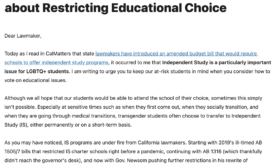I have just finished writing a two-part article for Growing Up in Santa Cruz on non-drug therapies for behavioral problems in kids. It started as a single article, but when faced with the masses of information I compiled, I asked if I could have two! So the first article (March) is about the reasons for this explosion of behavioral problems, why doctors and therapists sometimes turn to drugs without trying other therapies, and the problems with using drugs to treat behavior. The second article (April) will be about many alternative treatments and the scientific basis for their use.
It’s been a fascinating experience. I am definitely not the person who believes in things just because they are “natural.” Smallpox and cow dung are “natural”! But I find it offensive and downright dangerous how quickly child psychiatrists are turning to drugs to treat behavioral problems. Since drugs mask the problem but do nothing to address the reason why the behavior is happening, they are never anything but a quick fix. In some extreme cases, of course, a quick fix is necessary. But I believe that drugs should NEVER be the first resort for behavioral issues in kids.
Of course, studying anything about the human body is complicated enough; adding adults’ perception of kids’ behavior makes it even more difficult to separate fact from perception. I have never forgotten when my son was small and I read a study of the effect of sugar on children’s behavior. Assuming your child has a generally healthy diet and is not eating only sugary, easily digestible foods, sugar doesn’t have a significant effect on behavior. Reading this was like reading that the earth is, in fact, flat. All parents simply believe that sugar is a bad guy, a culprit that makes their children nuts. I read about one study where they told the preschool teachers that the kids had just eaten sugar; the teachers said that the children’s behavior was hyperactive. Other teachers were told that the children didn’t have sugar; the teachers of course thought that the kids were fine.
In other words, our perception of our kids’ behavior is highly malleable. A good study has to take this into consideration.
These days, there are starting to be some good studies out there. One concerned sodium benzoate, a common food preservative. After I read it, I went through our cupboard and started reading labels. We’re not big junk food people, and in fact most of the packaged food we get is pretty benign: crackers, Annie’s Mac ‘n’ Cheese (otherwise known as What The Six-Year-Old Will Always Agree To Eat), some packaged soups. I didn’t find sodium benzoate on anything.
Then I looked at the soy sauce. We are big fans of Asian food, and we cook lots of it at home. We get specialized sauces and other ingredients from Asian grocery stores in San Jose. Pretty much everything had sodium benzoate. Have I mentioned my daughter’s soy sauce addiction? If you want to get her to eat, J.A.S.S. — Just Add Soy Sauce.
So…I tossed out the basic soy sauce, the stuff that she puts on her food regularly. Went to Aptos Natural and got some tamari and Bragg’s Liquid Amino Acids. I had my doubt about the latter: my daughter can read, and that’s a pretty off-putting name. But I served her some tofu with the Bragg’s (which I billed as a cool new type of soy sauce I read about), and she pronounced it “Great!” Phew.
I’m not sure what we’ll do about the sauces that can’t be replaced with health food versions. When a recipe calls for “dark” soy sauce, it really does need that thick, luscious, gooey stuff they sell in Chinese grocery stores. So we’ll have to figure out whether we just want to limit how much we cook with it or give up on being authentic. At least it’s easy enough to change out the sauce that she eats a measurable quantity of.
It would be great if companies just stopped using this additive. But since that’s not likely to happen anytime soon, at least foods with sodium benzoate should be required to be labeled as possibly hazardous to children’s developing bodies. I don’t think that will happen either, but I wonder how much we’ll find out in the future about what we’ve done to ourselves and our children by allowing our bodies to become unwitting subjects of large-scale experiments like this.
I’ll write further ruminations about what I learned.
All of my sources will be posted on GUISC.com once the articles are out. Check them out…



